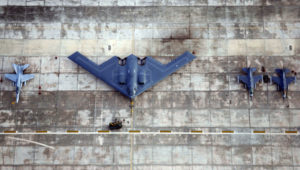Special to WorldTribune.com
 By Donald Kirk
By Donald Kirk
Would Kim Jong-Un mind giving Moon Jae-In a break?
More than any other South Korean leader in years, Moon would like nothing better than to be the one to bring about North-South reconciliation. Wouldn’t it be great, Moon’s newly appointed former activists must be saying, if Kim Jong-Un invited Moon to Pyongyang instead of awaiting “the right conditions.”
It would be so easy for Kim to outfox the Americans, who clearly think Moon will settle down, mute his pronouncements about talks with the North and cooperate as did his predecessors.

But no, right away, Kim Jong-Un opted to turn Moon’s dreams into nightmares, directly challenging him by launching an intercontinental ballistic missile with a range of 4,500 kilometers.
Nor was this one just another mid-to-short-range shot. It soared an incredible 2,111 kilometers above earth, indicating it could easily have reached U.S. bases anywhere in Japan or, for that matter, the U.S. territory of Guam, home of the strategic Andersen Air Force base from which U.S. B1B bombers fly now and then over South Korea.
Any hopes Moon may have of “engaging” the North in dialogue seem certain to run afoul of Kim’s refusal to stop testing missiles capable some day of carrying nuclear warheads to the U.S. mainland.
With 59 percent of Korean voters in favor of someone other than Moon, he has no mandate to jettison the pro-American policies of Korean presidents since the founding of the Republic of Korea under Syngman Rhee in 1948.
Given the depth of conservative and moderate sentiment, Moon cannot show weakness in the face of North Korean threats. The rise of a liberal in South Korea, moreover, still leaves relations between Seoul and Washington in flux.
Moon is not going to be as enthusiastic about the U.S.-Korea alliance as would a conservative, but he cannot so easily turn against agreements made between the U.S. and the previous conservative regime. How can he call for removal of the THAAD counter-missile battery even as Kim Jong-Un is challenging him with missile tests?
Although hardly a rabble-rousing leftist, Moon faces opposition from possibly a majority of his countrymen and will have difficulty mustering support in the National Assembly for reformist legislation if badly divided conservatives join forces.
Under these circumstances, Moon has not only endorsed the U.S.-Korea alliance but is going to Washington in the near future to meet President Trump after having been widely quoted during his campaign as saying that he would like first to see Kim Jong-Un in Pyongyang.
Considering Moon’s eagerness for negotiations with the North, Trump and his team have to deal carefully with him in order to preserve the U.S-Republic of Korea alliance.
One sensitive issue: those annual U.S.-RoK war games that infuriate North Korea. Military commanders say they are essential. How else, they ask, can the 28,500 U.S. troops in Korea be ready “to fight tonight” on behalf of their South Korean ally?
Moon’s relationship with the U.S., moreover, will be complicated by some of Trump’s remarks. South Korea under any president, conservative or liberal, would not consider paying $1 billion as Trump suggested was owed for THAAD.
Trump is fueling the controversy by calling for a renegotiation of the KORUS FTA, the Korea-U.S. free trade agreement, in view of America’s rising trade deficit with South Korea.
Neither conservatives nor liberals would be inclined to renegotiate the KORUS FTA. Obviously, Moon will resist Trump’s demands.
More importantly, Moon’s response to still more North Korean missile tests, or a sixth nuclear test, will be a clear indication of his basic outlook.
How willingly will he enforce sanctions or adopt other stringent measures for dealing with the North? And what if North and South Korea came to blows again in the Yellow Sea, the scene of bloody North-South battles in recent years?
Washington has repeatedly vowed to rush to Seoul’s aid in a showdown. South Korea and the U.S. over the years have developed extremely close military ties on a working level.
U.S. and Korean forces coordinate under a “combined command,” while the South acquires much needed military equipment, including fighter planes, from the U.S. While conservatives keep close watch on whatever Moon is doing, he should place a high priority on these relationships amid North Korean threats and testing.
Donald Kirk has been covering the ups and downs of the confrontation of forces in the region for decades. He’s at [email protected]
